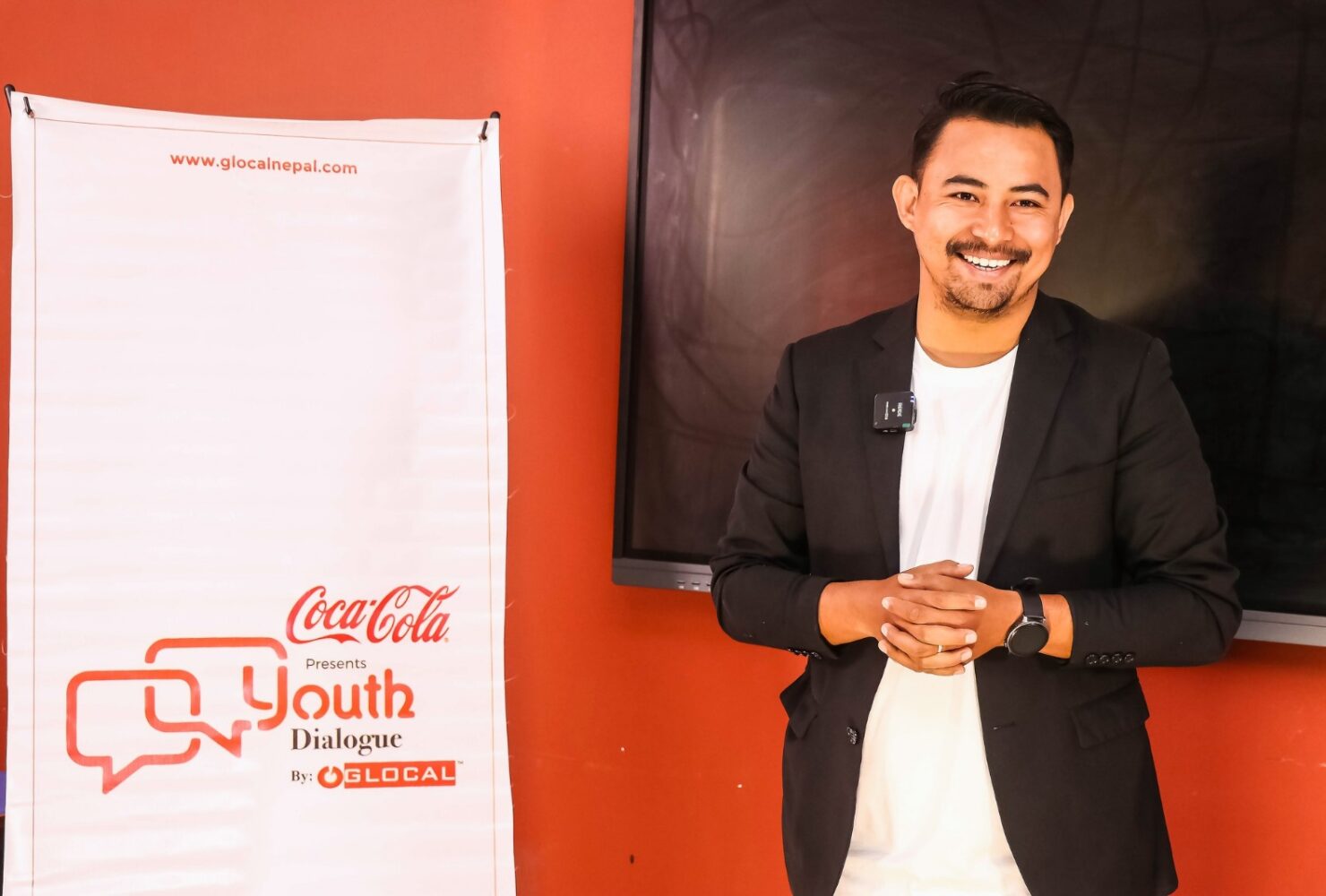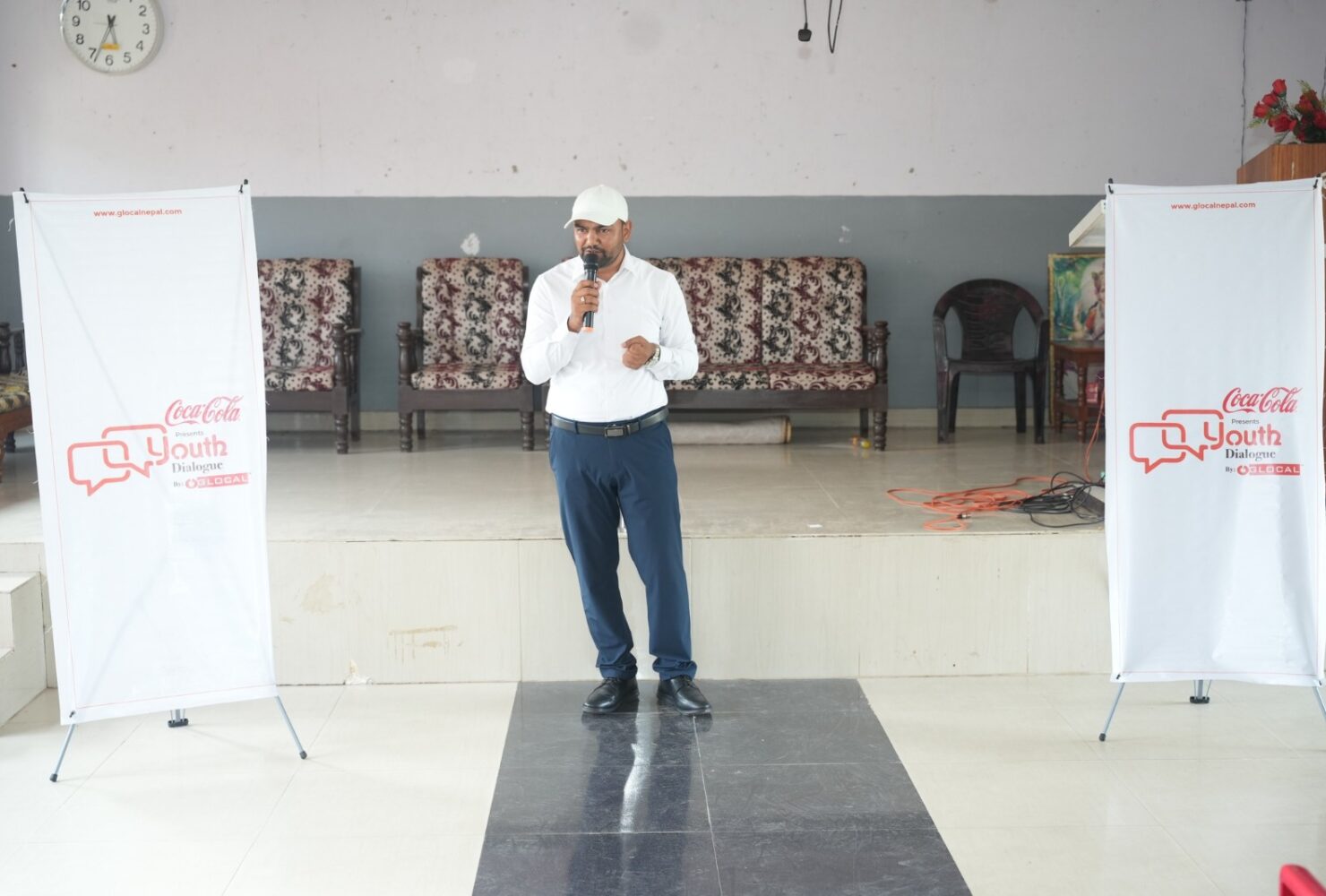Glocal Pvt. Ltd. organizes the monthly series of youth-focused discussion sessions known as Coca-Cola Presents Youth Dialogue. It is a platform where different people from different sectors share their experiences, challenges, and motivations.
Youth dialogue delivered fascinating sessions on a variety of topics like sport, environment, entertainment, business, culture, and tourism to develop skills for an ever-changing market. The speakers of the program include youth influencers, skillful people, entrepreneurs, politicians, and celebrities. The discussion series is one hour long and includes a live audience.
The Youth Dialogue 2.0 episode of Coca-Cola presents Youth Dialogue on the topic “Role of Youth Towards a Sustainable World’” ends with a successful presence of students amidst an event held at the premises of Kathmandu Don Bosco College. The dialogue had the presence of three distinguished panelists as the invitees of the Youth Dialogue and they were:
- Ms. Sneha Shrestha, Communication & Sustainability Manager, Coca-Cola Beverage, Nepal & Public Relations Specialist
- Ms. Anushka Shrestha, Miss Nepal 2019, CEO/Co-founder of Makkuse
- Ms. Shristhi Vaidhya, Finance and HR Director of Vaidya Group & Curator for the Global Shapers Kathmandu Hub
Here is the gist of the discussion
Ms. Sneha was asked how she visualizes today’s youths and perceives their potential. She mentioned, At Coca-Cola, various projects are worked on, with a particular focus on waste management and plastic recycling, as well as projects related to water. Collaborations are made with organizations and NGOs like Doko Recyclers for waste, WWF CIUD, and Splash for water. In these partnerships, there is a noticeable presence of youngsters. Ms. Sneha emphasized that the younger generation displays a remarkable dedication and enthusiasm for their work, showcasing a profound passion for their pursuits. Their approach is characterized by open-mindedness, not only towards their communities but also broader environmental concerns. She believes that today’s youth is indeed a source of significant potential and enthusiasm, which is clearly evident in their active engagement and commitment to positive initiatives.
Responding to the same question, Ms. Anushka reflected on her thoughts from when she was around 15 or 16. Back then, she questioned why the burden of responsibility was solely placed on the youth. At 27, she still considers herself a part of this dynamic group, understanding the unique power they hold. She described youth as a sweet spot, a time of energy and opportunity. With access to abundant information through technology, she views the youth of today as globally connected and incredibly resourceful. Despite the overwhelming array of choices, she sees a determined generation building their paths. In terms of sustainability, she mentioned how the current generation shows genuine concern for the future, discrediting the perception of them being self-centered. Ms. Anushka concluded by acknowledging the youth’s considerate nature and their genuine worry about the future.
Youth Power: Embracing Technology for a Sustainable Future
Ms. Shristhi, reflecting on her school days, recalls a time when technology was far less advanced. Back then, mobile phones were not a common possession. She reminisced about how they didn’t have the means to easily share their voices with the world during their youth. Today’s youth, on the other hand, possessed a remarkable opportunity to utilize various platforms for expressing themselves and making a difference. Ms. Shristhi emphasized the importance of this platform and the potential for the youth to effect positive change in the world. With the advent of technology and multiple platforms, the current generation had ample opportunities to explore their identities and challenge the existing norms and paradigms.
Ms. Shristhi underlined the significance of this perspective, particularly in the context of sustainability. She noted that sustainability is no longer just a subject to learn; it’s a lens through which the youth view the world, a lens they must adopt to navigate the challenges of climate change and technological advancements that will significantly impact their lives. Ms. Shristhi believes that today’s youth are in a prime position to make a difference and embrace this lens to drive meaningful action, more so than her own generation. This, she sees, as a substantial benefit of the youth of today.
Coca-Cola’s Dimensions to Engage with Youths
When asked about Coca-Cola’s engagement with young people, Ms. Sneha highlighted their strong youth focus. They have two core environmental pillars: waste-plastic recycling and water conservation. Their global mission, “world without waste,” includes initiatives like the Mountain cleanup campaign, aiming to collect and recycle all bottles sold, regardless of the brand. They collaborate with partners and use recyclable PETE Plastic. In Nepal, they’re striving for 100% collection and recycling of sold bottles by year-end. Ms. Sneha emphasized water’s significance in Coca-Cola’s beverages and their commitment to environmental initiatives in Nepal, which involve replenishing water through rainwater harvesting, groundwater recharge, and WASH programs in schools.
Regarding social responsibility, they prioritize communities, with initiatives like the “Saksham” program empowering women in their value chain. They also run an accelerator program, awarding seed money to young women entrepreneurs, and maintain partnerships with organizations like Glocal for youth engagement. While upscaling projects haven’t started in Nepal, they plan to begin next year. In places like Pokhara, Himalayan Plastics demonstrate how they can transform plastics, even into new bottles, or utilize them innovatively, such as in building roads. Coca-Cola’s commitment is to continuously upcycle plastics, advancing the circular economy concept they strive to achieve.
Makkuse’s Sustainable Vision and Practices
Further the question was asked to Ms. Anushka about Makkuse, how have they envisioned their role, how do they work and initiate the practices in a broader sustainability moment, she shared the visionary behind Makkuse, stressed their unwavering dedication to sustainability across all aspects of their operations. She added that emphasizing recyclability and reusability, they pointed to their choice of packaging materials as a conscious decision. Glass jars and eco-friendly Lokta paper packaging constitute approximately 95% of their materials, showcasing their commitment to sustainability.
While acknowledging the economic considerations, Ms. Anushka highlighted the need to strike a balance between growth and environmental responsibility. Seeking guidance from experts and learning from experiences, particularly concerning plastic usage, has significantly influenced their sustainable approach. Anushka’s advice for emerging businesses resonates with their philosophy: Begin with a strong focus on sustainability, as it’s deeply rooted in their brand identity. According to her, Makkuse epitomizes authenticity, Nepali heritage, luxury, and, most importantly, sustainability—a guiding lens for all their actions.
Empowering Youth for Sustainable Change
When asked about her motivation to actively engage with the youth on sustainability, Ms. Shristhi shared that her journey began by becoming a part of the Global Shapers Community. This international community, with a local chapter called Global Shapers Kathmandu, was unique in its commitment to address social and community-related issues. Through the Global Shapers platform, they aimed to educate various age groups about climate change and drive action. They organized climate change dialogues and collaborated with WWF Nepal to create educational resources like the ‘Kalpavriksha’ book, distributing it. The objective was to provide a comprehensive understanding of climate change in an engaging manner for young students.
Ms. Shristhi emphasized that empowering the youth was essential, believing they could effectively champion the cause of climate action within their communities. The initiatives undertaken so far represent only a fraction of their aspirations, with a firm belief in the youth’s potential to make a substantial difference.
Talking about the essential skills for youth to navigate today’s competitive world, Ms. Sneha emphasized the importance of voicing one’s opinions aligned with their passion as a crucial skill. Additionally, she highlighted the significance of partnership, suggesting active engagement in volunteering with NGOs like Creations during free time. For those inclined towards technology, she urged the pursuit of innovative ideas contributing to sustainability. Ms. Sneha encouraged relentless perseverance in promoting these ideas through various platforms, aiming to influence not only friends and family but also policymakers, underlining the power and confidence young individuals possess.
Essential Skills for Personal Growth in the Digital Age
Speaking about leveraging technology and innovation via social media for personal growth, Ms. Anushka highlighted two essential skills. She emphasized the significance of research, particularly in the context of social media, advising against forming opinions without a thorough understanding of the content’s depth. Ms. Anushka emphasized the importance of exercising critical thinking and avoiding mindless adherence to trends, particularly in the expansive domain of technology. She mentioned the potential of social media as a platform for sharing and learning, citing sustainable practice groups as an example. Ms. Anushka emphasized the role of thinking skills, persistence, and leveraging social platforms to turn ideas into action and reach a wider audience.
Responding to the same question, Ms. Shristhi suggested youths must carefully consider and be flexible in choosing their career paths. Being adaptable is key to staying relevant in a rapidly evolving world, especially considering the path of technology and sustainability. It’s crucial to stay informed, conduct research, and acquire knowledge to prepare for an uncertain future. Technology, including AI, is advancing fast, and staying updated is vital to avoid becoming obsolete. Further she added, developing critical thinking skills is very essential for success.
In her advice to youths, Ms. Shristhi emphasizes the importance of asking questions and challenging oneself, considering it a fundamental aspect. Anushka added that cultivating a habit of sharing opinions, regardless of being introverted or extroverted, is vital. Both emphasize that expressing opinions is a valuable practice and doesn’t make anyone bad or wrong.
In summary,
The discussion collected valuable perspectives from both panelists and engaged audience members. The panelists responded to audience questions, highlighting the significance of empowering and involving youth as proactive contributors to sustainability efforts. The diverse perspectives of the panelists, coming from different sectors, have provided a holistic view of how youth can contribute to a greener and more equitable future.





